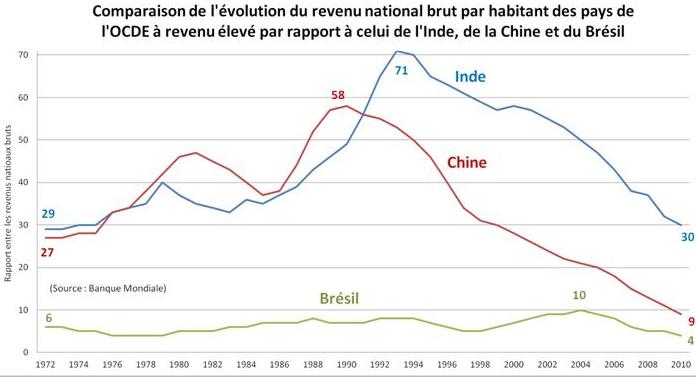The economical convergence of the world has started. This graph is extracted from an article by Robert Branche (in French): “Facing the convergence of the world economy”.

It shows the evolution over time of the ratio of the GDP per capita of a choice of emerging countries (Brazil, China and India) over the OECD average. There is no doubt in this graph that a convergence starts around 1994 – around the time the Fourth Revolution started, at least for India and China. This happens at the same time than the significant shift in the value creation chain in the 1990’s (see the post “Visualizing the demise of manufacturing“).
This convergence will continue. Ultimately the GDP per capita of China and India will be close (on average) to the OECD countries.
What will be the final outcome? For Robert Branche the outcome will be necessarily, a decrease of the standard of living in the OECD countries by about 50% until 2050. The reason stated is that the standard of living in the OECD is artificially high thanks to low-cost importations from China and India – which will become more expensive. Is that so problematic? It would mean that the standard of living would be back to say, the one the OECD had in the 1980’s. Is that a big issue?
While the worldwide economic convergence will probably accelerate thanks to the Fourth Revolution, the outcome, in terms of standard of living in developed countries, is more debatable. Developed countries will see significant changes in their economy; whether they lean into them or resist them will decide on their ultimate fate. Countries can go down in terms of standard of living very quickly (as in Argentina in the 1970 to 1990’s for example). On the other hand, if developed countries adopt the Fourth Revolution early enough, there is no reason why the standard of living, and the quality of life, should be significantly lowered.
In any case the world will see more shifts of wealth and standards of living in the next 50 years than in the 20th century.
Listen to the warning: let’s lean into the Fourth Revolution. That is the only way developed countries can preserve their future.
